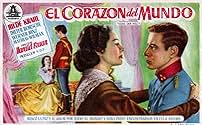Aggiungi una trama nella tua linguaYoung Bertha von Suttner meets Alfred Nobel and envisions the horrendous effect his invention of dynamite will have on modern warfare. Bertha and husband Arthur become pacifists, with Bertha... Leggi tuttoYoung Bertha von Suttner meets Alfred Nobel and envisions the horrendous effect his invention of dynamite will have on modern warfare. Bertha and husband Arthur become pacifists, with Bertha being awarded the Nobel Peace Prize in 1905.Young Bertha von Suttner meets Alfred Nobel and envisions the horrendous effect his invention of dynamite will have on modern warfare. Bertha and husband Arthur become pacifists, with Bertha being awarded the Nobel Peace Prize in 1905.
- Regia
- Sceneggiatura
- Star
- Premi
- 2 vittorie e 5 candidature totali
Recensioni in evidenza
First of all, the title is misleading: the film is primarily focused on the life of Bertha Felicie Sophie von Suttner and not Alfred Nobel. The other major flaw was the excuse given for Alfred Nobel selling his patents for dynamite to arms trader and financier (Parisian Banque de la Seine) Basil Zaharoff (assuming they ever met in real life): that he was preyed upon by Zaharoff because he was a "lonely guy". In reality, he was a member of the very prominent and wealthy Swedish Nobel family. His father, Immanuel, founded a war supplies factory (Fonderies et Ateliers Mécaniques Nobel Fils) producing explosive sea mines for the Russians in the Crimean War, and his younger brother, Ludvig Immanuel Nobel, became a wealthy oil tycoon (Branobel). How could Alfred be the frail, unknowing pawn the film makes him out to be? In the movie we see Alfred Nobel demonstrating his dynamite to military personnel. Then it shows Zaharoff convincing him that if it is sold to them then world peace will be had through the deterrent of "mutual assured destruction". How can we honestly believe that such an intelligent man could be so naive? The movie is preachy and the acting is terrible. I would suggest another source if you really want to learn something about Alfred Nobel and the Nobel Family. His "invention" made Alfred Nobel a multimillionaire.
A special note: The Nobel Prize for economics is actually given by the Sveriges Riksbank Prize in Economic Sciences in Memory of Alfred Nobel. This "privilege" of using the Nobel name began in 1968, when the Swedish Central Bank (Sveriges Riksbank) began making annual endowment payments "in perpetuity" to the Nobel Foundation.
This movie seems more like a deflective propaganda piece riding on the back of a pacifist (Bertha Felicie Sophie von Suttner).
A special note: The Nobel Prize for economics is actually given by the Sveriges Riksbank Prize in Economic Sciences in Memory of Alfred Nobel. This "privilege" of using the Nobel name began in 1968, when the Swedish Central Bank (Sveriges Riksbank) began making annual endowment payments "in perpetuity" to the Nobel Foundation.
This movie seems more like a deflective propaganda piece riding on the back of a pacifist (Bertha Felicie Sophie von Suttner).
This well-done film is really a life story of Bertha Felicie Sophie von Suttner (1843-1914), a 19th century peace activist who won the Nobel Peace Prize in 1905. This aristocratic woman was a normal product of her time and in the film we see how she supported her country, Austria, in time of war. However, the horrors of the Austro-Prussian War of 1866 change her attitude to one of seeking an end to warfare and this change in attitude alienates her from her employer and from her boyfriend. In 1876, Bertha travels to Paris where she applies for a position as secretary to Dr. Alfred Nobel. This is where we meet Nobel for the first time and we learn that he is a very lonely man as well as a scientific genius. Nobel hires Bertha and, learning of his discovery of dynamite, she makes Nobel promise her that it will only be used for good and not for evil. The discovery of the formula for dynamite by Nobel is a major event of its time and his formula is wanted by every European government. Nobel is persuaded by his business partner, Basil Zaharoff, that selling the patents for dynamite to each and every European government would achieve ever-lasting peace by creating a deterrent to warfare for each government that possessed it. This idea, of course, doesn't work, as seen with nuclear weapons in our own time in the 21st century. Anyway, Bertha gets married, leaves Nobel's employment and continues her work as a pacifist. She writes famous books calling for peace. Her most famous novel, Die Waffen nieder [Lay Down Your Arms], is published late in 1889. Nobel comes back into the story as a believer and follower of Bertha's, telling her of his mistake in letting governments have his dynamite formula and calling it his "sin." The film shows Bertha receiving the Nobel Peace Prize in 1905 and then shows her death in 1914 on the eve of the First World War. Overall this movie is an excellent anti-war story with a very powerful message from the 18 and 19th centuries that still resonates today. The acting is very good and this movie is well worth a look.
Lo sapevi?
- QuizFinal film of Hansi Wendler.
I più visti
Accedi per valutare e creare un elenco di titoli salvati per ottenere consigli personalizzati
Dettagli
- Tempo di esecuzione1 ora 53 minuti
- Colore
- Mix di suoni
- Proporzioni
- 1.37 : 1
Contribuisci a questa pagina
Suggerisci una modifica o aggiungi i contenuti mancanti





















